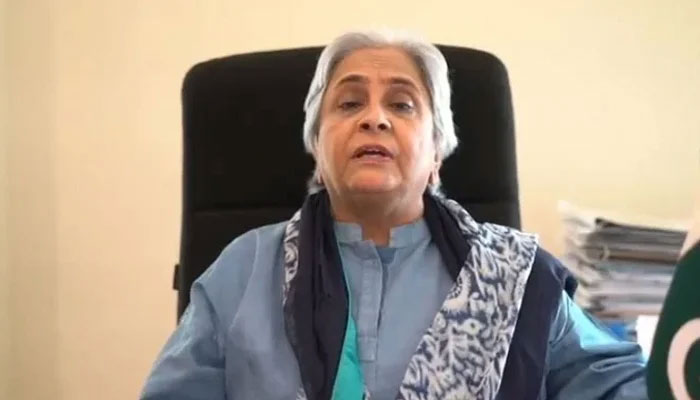Dr Azra wants each university to conduct MDCAT itself
Sindh Health Minister Dr Azra Pechuho has said that she wants the Medical and Dental Colleges Admission Test (MDCAT) to be conducted by each university separately, as undertaking the exercise at the current large scale undermines transparency.
Speaking at the launch ceremony of a cutting-edge Family Planning Skills Lab at Jinnah Postgraduate Medical Centre (JPMC) with USAID Mission Director Kate Somvongsiri on Thursday, she said the test is conducted at the national level, but it is difficult to ensure transparency with so many students appearing in at the same time.
The health minister suggested that every university should conduct the test itself, which would facilitate students and reduce chances of the paper being leaked. In a significant step toward advancing reproductive health care in Sindh, the United States Agency for International Development (USAID) and Sindh government inaugurated a cutting-edge Family Planning Skills Lab at the JPMC.
Dr Azra and USAID Mission Director Kate Somvongsiri led the launch event, reaffirming their commitment to expanding access to quality healthcare services across the province. Speaking at the event, Dr Azra emphasised the vital role of family planning in improving public health outcomes and addressing the province’s healthcare needs.
“Many women resort to terminating pregnancies; spacing between children is essential,” she remarked, underscoring the importance of accessible family planning services in Sindh. She said the lab established with USAID’s support would provide essential facilities and training for doctors and health workers to equip them for delivering high-quality care.
Reflecting on other pressing health issues, the health minister touched on the efforts to strengthen the routine immunisation programme, particularly in the light of polio concerns. “The polio virus still exists in our sewage system, and we are working hard to fortify routine immunisation efforts to address this,” she stated, highlighting the critical need for ongoing vigilance and public health interventions.
In addition to family planning, Dr Azra also advised the public to protect themselves against mosquito-borne illnesses such as dengue and malaria. “I would like to remind people to keep their distance from mosquitoes,” she said, stressing the need for preventive measures amid the rising cases of these vector-borne diseases.
She acknowledged USAID’s collaboration with the Sindh government, describing it as essential for fostering sustainable development and ensuring reproductive health access across the province. “This lab has been redesigned with USAID’s assistance, offering new facilities and training programs for healthcare providers,” she added.
The Family Planning Skills Lab is part of the refurbished Reproductive Health Services-A (RHS-A) Master Training Centre at JPMC, a key initiative to support healthcare professionals in acquiring advanced skills in family planning. The USAID mission director also praised the partnership, stating that the lab’s inauguration represented a shared goal to promote maternal and child health as well as informed family planning choices. “Today’s launch is a testament to our joint commitment to expanding high-quality healthcare access, especially for women and vulnerable groups,” Somvongsiri noted.
-
 Queen Elizabeth Tied To Andrew's Sexual Abuse Case Settlement: Report
Queen Elizabeth Tied To Andrew's Sexual Abuse Case Settlement: Report -
 Mark Ruffalo Urges Fans To Boycott Top AI Company Boycott
Mark Ruffalo Urges Fans To Boycott Top AI Company Boycott -
 Prince William Joins Esports Battle In Saudi Arabia
Prince William Joins Esports Battle In Saudi Arabia -
 Princess Beatrice, Eugenie Are Being Ripped Apart: ‘Their Relationship Is Fully Fractured’
Princess Beatrice, Eugenie Are Being Ripped Apart: ‘Their Relationship Is Fully Fractured’ -
 Arden Cho Shares Update On Search For ‘perfect’ Wedding Dress Ahead Of Italy Ceremony
Arden Cho Shares Update On Search For ‘perfect’ Wedding Dress Ahead Of Italy Ceremony -
 Ariana Madix Goes Unfiltered About Dating Life
Ariana Madix Goes Unfiltered About Dating Life -
 Prince William Closes Saudi Arabia Visit With Rare Desert Shot
Prince William Closes Saudi Arabia Visit With Rare Desert Shot -
 'King Charles Acts Fast Or Face Existential Crisis' Over Andrew Scandal
'King Charles Acts Fast Or Face Existential Crisis' Over Andrew Scandal -
 Brooklyn Beckham Charging Nearly £300 In Ticket Cost For Burger Festival
Brooklyn Beckham Charging Nearly £300 In Ticket Cost For Burger Festival -
 Prince William Makes Unexpected Stop At Local Market In Saudi Arabia
Prince William Makes Unexpected Stop At Local Market In Saudi Arabia -
 Zayn Malik Shares Important Update About His Love Life
Zayn Malik Shares Important Update About His Love Life -
 Kate Middleton, William Are Holding Onto Their Hats As Worse Gets Threatened: Behind The Veil Of Shame
Kate Middleton, William Are Holding Onto Their Hats As Worse Gets Threatened: Behind The Veil Of Shame -
 British Soap Awards Scrapped Again As ITV Confirms 2026 Hiatus
British Soap Awards Scrapped Again As ITV Confirms 2026 Hiatus -
 Climate Nearing Dangerous Tipping Points, Study Shows
Climate Nearing Dangerous Tipping Points, Study Shows -
 James Van Der Beek, 'Dawson's Creek' Star, Dies At 48
James Van Der Beek, 'Dawson's Creek' Star, Dies At 48 -
 Threads Launches Dear Algo AI Feature To Personalise Feeds In Real Time
Threads Launches Dear Algo AI Feature To Personalise Feeds In Real Time




